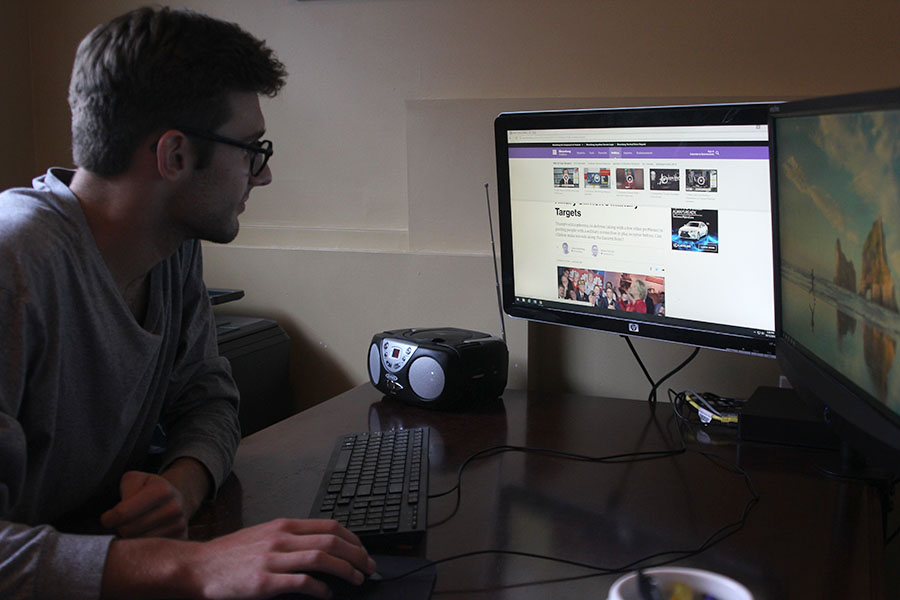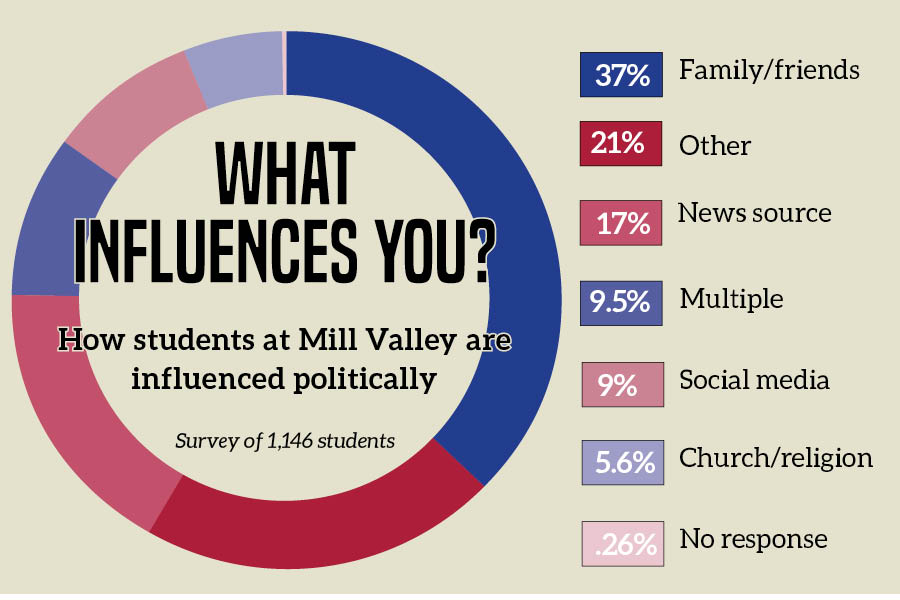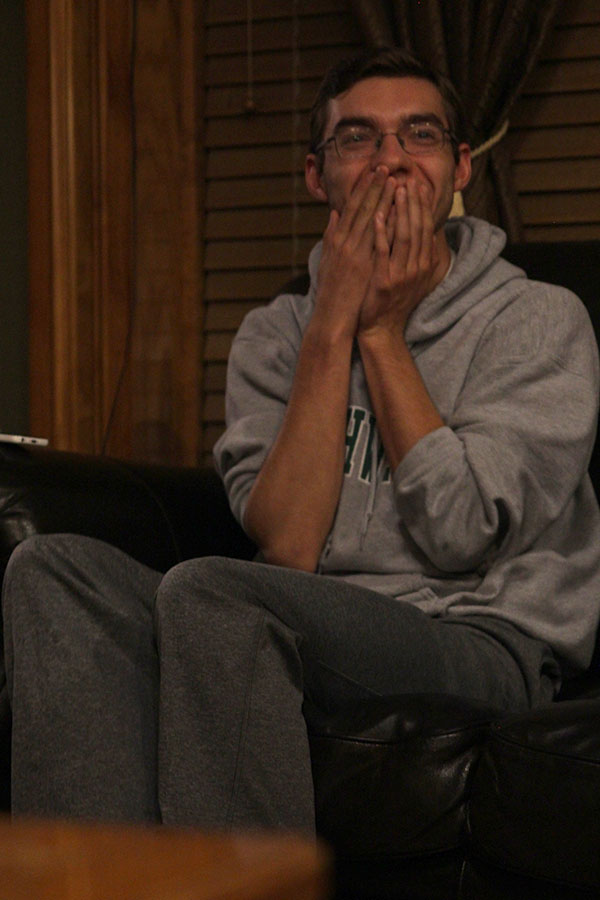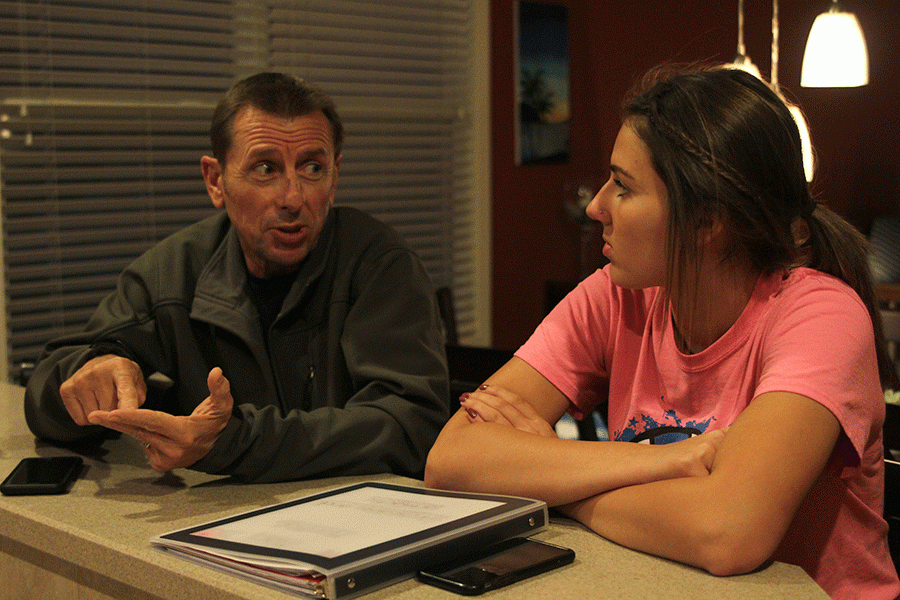Nodding along with her dad, junior Maci Montee discusses politics at the dinner table.
Student political opinions are influenced by societal factors
Media influence, peer presence plays large part in this year's election for students
As students scroll through Twitter, turn on the nightly news or even discuss politics with family members, their personal political beliefs are being influenced, for better or for worse.
Social media, news sources, peers, religion and family members all have a impact on a person’s political spectrum and the candidate in which they support.

Senior Jack Campbell reads from Bloomberg News on Wednesday, Oct. 12.
According to senior Jack Campbell, the omnipresence of social media sites alters the way students receive their political news; because students spend a lot of time on social media, they provide more accessible and easier ways to obtain political information.
“People don’t really like to read and people don’t really watch the news anymore, so going on Twitter and seeing a headline or something is probably how most people get their information,” Campbell said.
In comparison, senior Tom McClain thinks that social media should be used sparingly because social media content doesn’t directly come from the candidate.
“The reality is, most candidates’ social media profiles … is some campaign aid tweeting out excerpts from their website, excerpts from their speeches [or] whatever some focus group told them to tweet out,” McClain said. “So, I don’t really pay much attention to what their social media says.”
Junior Maci Montee said that while social media can be used to access political news, it shouldn’t be the sole source of information.
“I think whatever [students] see online, especially on Twitter, they believe; they don’t really go into more depth about what is being said to see if it’s really true,” Montee said.
In addition to social media, news sources affect both candidate coverage and student interpretation of political information. McClain said that students should pay attention to news sources because they provide new and applicable information.
“I think that most voters, myself included, are not experts on any issue and we probably don’t even know a small fraction of what there is to know about an issue,” McClain said. “So, when I read something or hear something from someone who is vastly more informed about an issue … than I am, then that’s inevitably going to shape how I look at that issue.”
 News sources that provide political news also frequently appear to be biased to some students, including Montee.
News sources that provide political news also frequently appear to be biased to some students, including Montee.
“It’s kind of hard to find [news] that’s not biased, either towards Trump or towards Hillary, there’s not that middle ground,” Montee said. “Honestly, you have to really go into depth; you have to listen to this news channel or this news channel and you need to get both sides of the story.”
Social studies teacher Cory Wurtz said that students should not limit themselves to only listening to or reading from one source. By reading from multiple sources, students will be able to form their own opinion, according to Wurtz.
“Gather the evidence first, sort through the evidence then come up with your answer,” Wurtz said. “Most people want to come up with the answer and then find evidence to support their answer.”
Family influence has also impacted student political views, causing them to either align with their family opinions or form their own opinions. Montee said that her dad has inspired her to want to become educated about politics.
“I’ve been raised in a very conservative household, so I’ve kind of just been brought about these beliefs,” Montee said. “Me and [my dad] talk about [politics] a lot and he’ll give me websites to look at or even tell me what to watch on TV.”
Opposite, junior Zach King’s political beliefs directly oppose those of his dad.
“My mom’s [beliefs] are generally the same [as mine], but my dad is very conservative. We’re way different in every aspect,” King said. “I generally took a lot of opinions from my mom because I spend a lot of time with her.”
Campbell thinks that some students tend to lean toward the political values of their parents because of early family traditions.
“There are kids that definitely go hunting, for example, and that’s always been something they’ve done from a really young age, and so practicing their Second Amendment right is a big deal; that just immediately labels them as a conservative,” Campbell said.
Furthermore, religion sometimes greatly affects student beliefs in specific political issues, including in the beliefs of sophomore Faith Dmyterko.
“I have viewed [political issues] based on my religion, especially topics like abortion,” Dmyterko said. “[My religion] has made me against [abortion]. It’s made me against a lot of stuff or for a lot of stuff.”
In addition, the opinions of peers play a large part in political views, especially a high school, according to Wurtz. To help form these political opinions, student classes, such as civics, are utilized.

Following a comment in the presidential debate on Sunday, Oct. 19, senior Tom McClain covers his mouth in surprise.
“Civics is important for freshman in particular because it is throughout high school that [students] will develop a lot of their political behavior,” Wurtz said. “Much of what they know right now is what they hear at home, and now the biggest influence in their life is not going to be their parents, it’s instead going to be their peers.”
Several social studies classes are implementing discussions about candidates into curriculums, according to Wurtz.
Campbell said that peers can provide new and different opinions on issues, and are ultimately beneficial to forming personal political opinions.
“I think I’ve become more influenced by [my] peers as I’ve gotten a little older, in my high school years. I think that there’s a lot that you can gain from your peers; they offer different viewpoints that you may not have ever thought of,” Campbell said.
McClain said that students should participate in political discussions without preconceived opinions.
“If you don’t go into those conversations with at least somewhat of an open mind, we’re not going to get anywhere with the gridlock; nothing’s going to change,” McClain said. “It’s important to have an open mind and talk to people that have a differing opinion than your own.”
